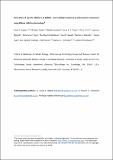Generation of specific inhibitors of SUMO-1- and SUMO-2/3-mediated protein-protein interactions using Affimer (Adhiron) technology
Abstract
Because protein-protein interactions underpin most biological processes, developing tools that target them to understand their function or to inform the development of therapeutics is an important task. SUMOylation is the posttranslational covalent attachment of proteins in the SUMO family (SUMO-1, SUMO-2, or SUMO-3), and it regulates numerous cellular pathways. SUMOylated proteins are recognized by proteins with SUMO-interaction motifs (SIMs) that facilitate noncovalent interactions with SUMO. We describe the use of the Affimer system of peptide display for the rapid isolation of synthetic binding proteins that inhibit SUMO-dependent protein-protein interactions mediated by SIMs both in vitro and in cells. Crucially, these synthetic proteins did not prevent SUMO conjugation either in vitro or in cell-based systems, enabling the specific analysis of SUMO-mediated protein-protein interactions. Furthermore, through structural analysis and molecular modeling, we explored the molecular mechanisms that may underlie their specificity in interfering with either SUMO-1–mediated interactions or interactions mediated by either SUMO-2 or SUMO-3. Not only will these reagents enable investigation of the biological roles of SUMOylation, but the Affimer technology used to generate these synthetic binding proteins could also be exploited to design or validate reagents or therapeutics that target other protein-protein interactions.
Citation
Hughes , D J , Tiede , C , Penswick , N , Ah-San Tang , A , Trinh , C H , Mendal , U , Zajac , K Z , Gaule , T , Howell , G , Edwards , T A , Duan , J , Feyfant , E , McPhereson , M J , Tomlinson , D C & Whitehouse , A 2017 , ' Generation of specific inhibitors of SUMO-1- and SUMO-2/3-mediated protein-protein interactions using Affimer (Adhiron) technology ' , Science Signaling , vol. 10 , no. 505 , eaaj2005 . https://doi.org/10.1126/scisignal.aaj2005
Publication
Science Signaling
Status
Peer reviewed
ISSN
1945-0877Type
Journal article
Description
This work was funded in part by a Leeds Cancer Research UK (CRUK) Development Fund and The Wellcome Trust (ISSF) (DJH), The Wellcome Trust (089330), BBSRC (BB/K000306/1 and BB/M006557/1) (AW) and The University of Leeds through Biomedical Health Research Centre support for the Leeds BioScreening Technology Group (MJM, DCT).Collections
Items in the St Andrews Research Repository are protected by copyright, with all rights reserved, unless otherwise indicated.

